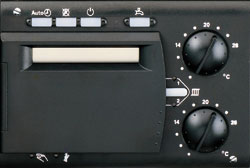Following the government’s Energy Review in July this year, energy efficiency is very much at the forefront of the agenda for the commercial heating sector. When selecting a new or replacement heating system for a building,
commercial specifiers must consider the impact of controls, which can significantly improve the energy efficiency of a boiler and earn credits under the new Part L2 Building Regulations. But as Richard Walker, national sales and marketing manager at Potterton Commercial, explains the need for more careful consideration of controls on a heating system’s functionality is long overdue

FOR many years the commercial heating sector has not focused sufficient attention on its use of controls but thanks to Part L2, this industry-wide problem is finally being addressed, benefiting the end user and most importantly, the environment. Modern boiler design has been taken to the limit with regard to energy efficiency, extracting maximum heat from the fuel burned. Further improvements must now be gained from good system design, and the use of appropriate controls.
The choice of controls for an installation is primarily driven by the use of the building. Appropriate controls ensure outputs are matched to the heat load requirements of the building, thus optimising efficiency gains.
When choosing controls, the energy efficiency of the boiler must now be a top priority for specifiers and installers. Under the Part L Building Regulations, standard efficiency and condensing products can be used in the replacement and new build sector but they should be controlled very differently. The benefits of even the most energy efficient boiler will be greatly diminished if it is not properly used and controlled.
To capitalise on the potential of high efficiency technology by allowing the boiler to condense, weather compensation controls are essential.
Weather compensation allows a boiler to reach optimum performance and compensate for changes in the temperature outdoors, thus saving fuel when the weather is milder.
Compensation controls meet the requirement of Part L2 to allow a building to be operated and maintained in such a way as to make most efficient use of fuel. It is important to note the correct calculation of a building’s heat load will ensure appropriate sizing and further boost the efficiency of a condensing boiler.
In addition to compensation controls, Part L2 Regulations state that systems should be sub-divided into control zones, where each area may have differing uses and heat requirements. For example, some areas of a building may have greater solar exposure, so the sun will generate additional heat through the windows, thus reducing the need for boiler operation.
Zones must also be capable of independent timing and temperature control. Providing different levels of heat in different environments throughout a building ensures end users are able to maximise levels of comfort and reduce fuel costs. Zone controls are available on-board or as optional extras.
Hot water and heating requirements must also be a significant consideration. Where both are needed, controls are available with a HWS priority system feature which is able to override the heating function for a short time to boost the hot water supply and meet demand. For single installations where only heat is required, specifiers can opt for more basic controls to get the most from the heating system.

Appropriate controls ensure outputs are matched to the heat load requirements of the building
For modular installations, controls are particularly important for effective sequencing. Sequencing ensures each boiler in the system is used for a similar period of time, thus distributing the heat load equally, and ensuring the boilers are brought into service only when needed. Therefore the heat output will closely matchbuilding heating demand. In the event of a breakdown, advanced controls can isolate a faulty unit and share the heat load between the remaining boilers until repairs can be carried out, ensuring no disruption.
When breakdowns do occur, intelligent controls not only keep the system up and running but some more sophisticated control systems offer advanced characteristics such as diagnostic features which are perfect for organisations monitoring a number of systems remotely. Diagnostic controls can alert service engineers to faults in an individual boiler, isolating the problem and the parts affected immediately. For buildings where facilities management staff are on site or able to access the system remotely through diagnostics, advanced and intelligent controls are particularly appropriate.
A building’s users have an important part to play in the effective working of heating systems and controls, yet are often overlooked.
For schools and other buildings without suitably trained on-site personnel, simple and user-friendly controls must be considered as recent studies have shown that some end users misuse their heating systems as they find the controls too complicated.
The introduction of the Part L2 Building Regulations is really going to wake up the heating industry and the way controls are perceived. Far from being just an add on, controls will become
an integral part of a heating
installation.
Potterton Commercial is already investing in researching and developing new control products to meet the demands of the post-Part L market where specifiers will need to be much more aware of the importance of taking control.